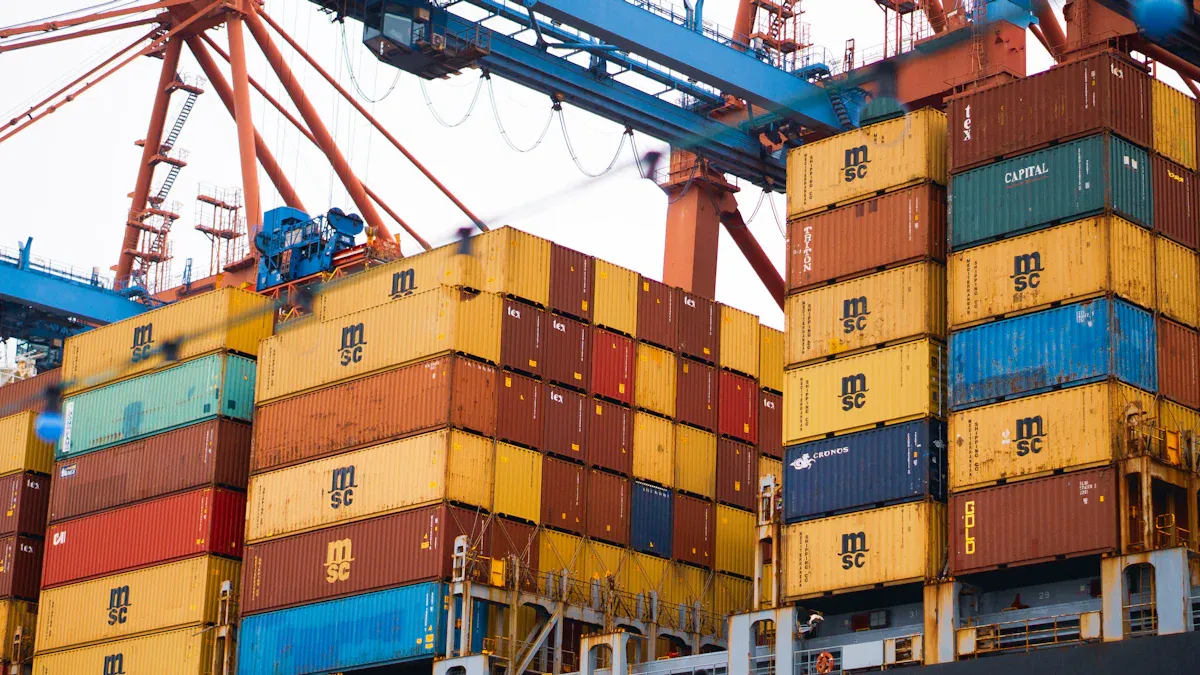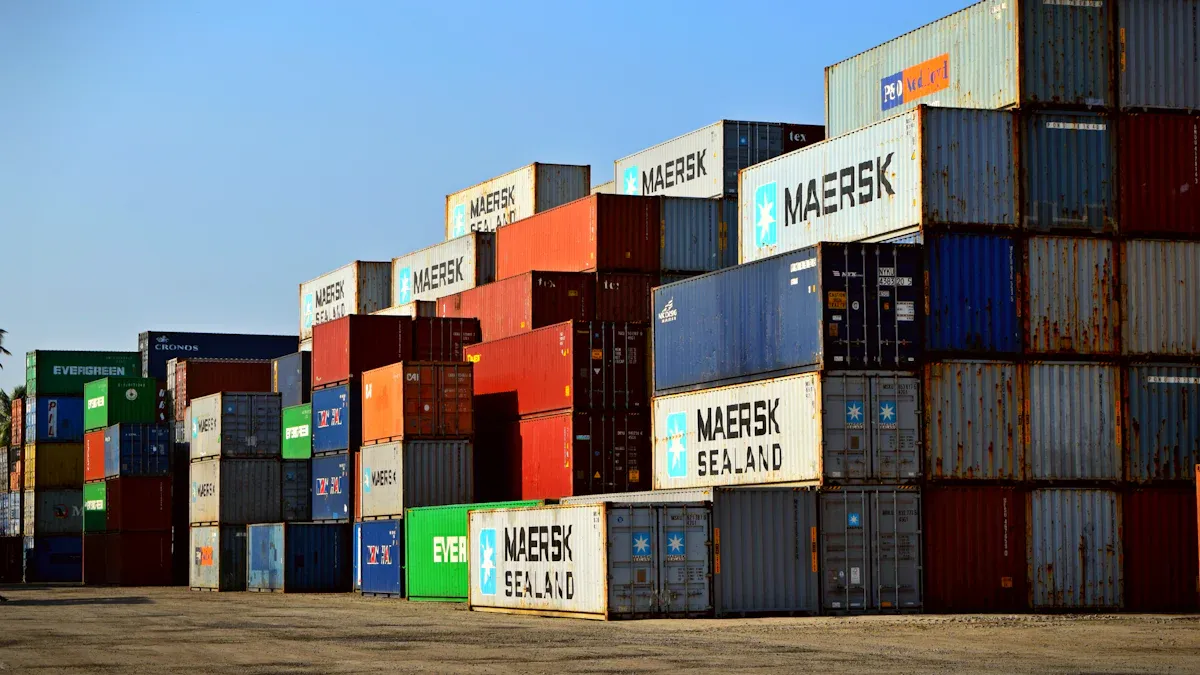Tips for Selecting the Right Overseas Logistics Service Provider

Growing your business worldwide? Picking the right logistics partner matters. The global shipping market is growing fast and could hit $5,951 billion by 2030. A good provider of overseas logistics service makes supply chains easier, saves money, and pleases customers. Their job? Making tricky shipping smooth and successful worldwide.
Key Takeaways
Pick a logistics company that knows global shipping well. Their skills make customs and shipping easier, saving time and money.
Find a company with good reviews and awards. These show they are trustworthy and provide great service.
Make sure the company has many services to offer. This makes your work simpler and avoids using too many partners.
Key Factors in Choosing the Right Partner
Picking the right overseas logistics service partner is crucial. It can greatly impact your global shipping success. Let’s explore the most important things to look for.
Expertise in International Logistics Services
Experience is key in international logistics. Choose a provider who understands cross-border shipping. They should know customs rules, freight forwarding, and global trade challenges. For instance, companies like LGI, with years of experience, handle these tasks well. Their knowledge saves you time and money.
An experienced provider can also solve unexpected problems. These include delays or compliance issues. Their skills keep your supply chain running smoothly.
Reputation and Industry Standing
A good reputation is important. Providers with strong reputations earn them through great service. Check reviews, testimonials, or awards to see their performance.
For example, partnerships like Vitesco Technologies and DHL show how trusted providers improve efficiency. A good reputation means reliability, which is vital for timely deliveries.
Comprehensive Range of Services
A great logistics partner offers more than shipping. They provide services like warehousing, customs clearance, and inventory management.
Having all services in one place simplifies your operations. It also reduces the need for multiple providers. This ensures your supply chain is fully supported.
Technological Capabilities and Real-Time Tracking
Technology improves logistics. Real-time tracking shows where your shipments are at all times. It helps reduce delays and gives live updates.
Studies show tracking lowers wait times and improves efficiency. Platforms like JUSDA’s JusLink use IoT and big data for better insights. This makes supply chains more transparent and effective.
Evidence Type | Description |
|---|---|
Perceived Wait Time Reduction | Real-time tracking users felt wait times dropped by two minutes. |
Actual Wait Time Reduction | Users also experienced a two-minute drop in actual wait times. |
Cost Transparency and Efficiency
Clear pricing is essential. You should know exactly what you’re paying for. Cost analysis helps find hidden inefficiencies and improves planning.
Efficiency is just as important. A provider offering affordable solutions without lowering quality is valuable. They help save money while keeping high standards.
Scalability and Adaptability
Logistics can be unpredictable. Market changes, seasonal demand, or global events affect supply chains. Your provider must adjust to your needs.
For example, Shopify handled 3.6 million sales per minute on Black Friday by scaling operations. Maersk adapted during COVID-19 to keep customers happy. A flexible partner helps your business succeed in tough times.
Customer Service Excellence
Good customer service is essential. On-time deliveries, correct orders, and clear communication matter. Studies show keeping customers informed boosts satisfaction by 20%.
Choose a provider who values communication and problem-solving. Real-time updates and quick responses build trust and strengthen partnerships.
Tip: Read customer reviews, check Net Promoter Scores (NPS), and feedback to assess service quality.
Questions to Ask When Evaluating a Logistics Service Provider
Picking the right logistics partner can feel hard. Asking smart questions makes it simpler. Focus on these key areas when choosing a provider.
Certifications and Accreditations
Certifications are more important than they seem. They show a provider follows rules and delivers quality. Check for industry-specific certifications like ISO 9001 or IATA. These prove they meet global logistics standards.
The Testing, Inspection, and Certification (TIC) market is growing fast. It was worth $211 billion in 2023 and may reach $285 billion by 2032. This growth shows how vital certifications are for quality and efficiency. Certified providers give you confidence your shipments are safe.
Tip: Always ask about their certifications first. It helps you judge their reliability quickly.
Risk Management and Safety Protocols
Risk management isn’t just avoiding problems. It’s about being ready for them. Providers with strong safety rules protect your goods during shipping. Ask how they handle delays, damages, or compliance issues.
Good risk management includes clear plans and strong leadership. Providers who focus on safety build trust and reduce problems. They should also explain their safety steps clearly to you.
Global Network Reach and Infrastructure
A provider’s global network is key to shipping success. A strong network means faster delivery and fewer problems. Big logistics companies often work with carriers and customs worldwide.
Look for providers offering air, sea, and land transport. They should provide door-to-door services for smooth delivery. A strong global network helps with tricky international shipping.
Case Studies and References
References and case studies show if a provider is reliable. Ask for examples of their past work. These stories reveal how they solve problems and deliver results.
Research shows good logistics providers focus on customer needs and clear communication. Providers who share real success stories build trust in their skills.
Callout: Don’t skip this step. Case studies show their real-world experience.
Technology Platforms for Supply Chain Visibility
Technology makes logistics better. Advanced tools let you track shipments in real time. This helps avoid delays and keeps you updated.
For example, Veeco Instruments cut shortages by 50% using better tools. Caterpillar saved 70 hours weekly with improved tracking. These examples show how technology boosts efficiency. Providers with advanced tools keep you informed at every step.
Checking History and Dependability
Timely Delivery Success
Delivering on time shows a provider is dependable. It proves they keep their promises. The On-Time Delivery (OTD) metric tracks how often shipments arrive as planned. This helps you see if a provider is reliable and efficient.
Tracking OTD has many advantages:
Streamline Industries delivered all shipments on time for two months.
Using real-time data improves delivery tracking and planning.
Picking a provider with good OTD ensures smooth shipping. It also helps avoid delays in your supply chain.
Feedback from Customers
Good reviews are like trusted advice. They show others trust the provider. Testimonials prove the provider has done well before. They also lower worries by sharing success stories.
Grouped reviews are even more helpful. They show what the provider does best and where they can improve. This feedback builds trust and boosts their reputation. When choosing a logistics provider, look for praise in communication, problem-solving, and delivery accuracy.
Awards and Recognitions
Awards show who stands out in logistics. They highlight providers known for great service and innovation. For example:
Award/Recognition | Date | Description |
|---|---|---|
08-11-2023 | Given for excellent customer service and performance. | |
Innovation in B2B Logistics Award | 12-01-2023 | Awarded for creative and effective logistics solutions. |
Best Logistics Service Provider | 07-14-2024 | Recognized for top performance at the AFLAS Awards. |
These awards prove a provider values quality and dependability. Look for such honors when deciding.
Handling Problems and Emergencies
Problems happen in global shipping. A good provider knows how to fix them. For example:
Company | Crisis Management Example |
|---|---|
UPS | |
DHL | Saved money by outsourcing some logistics tasks. |
XPO Logistics | Adjusted quickly to meet changing market demands. |
These examples show how top companies handle tough situations. Ask providers how they’ve solved past problems. Their answers will show their skills and flexibility.
Negotiating Terms for a Successful Partnership

Service Level Agreements (SLAs) and Performance Metrics
Picking a good logistics partner means setting clear SLAs. These agreements explain the standards your provider must follow. They ensure your shipping needs are met properly. SLAs often include key performance measures like delivery times and order accuracy. For example:
Metric | Description |
|---|---|
On-time delivery rate (OTD) | Percentage of shipments arriving within the promised time. |
Order accuracy rate | Percentage of correct orders, where even small errors cost a lot. |
Damage-free order rate | Percentage of deliveries arriving without any damage. |
These measures help you check if your provider is doing well. A reliable partner will focus on these to keep high standards.
Payment Terms and Cost Breakdown
Clear payment rules and cost details are very important. They avoid confusion and help you manage money better. For example, knowing payment deadlines helps you plan your budget. Transparent terms also make sure both sides know their financial duties, lowering risks.
In global shipping, costs can be confusing. For instance, CIF agreements split costs and risks at different stages. A detailed cost breakdown shows who pays for what. This keeps your partnership steady. Always agree on these terms early to avoid problems later.
Setting Clear Expectations for Collaboration
Good partnerships need clear expectations. When you and your provider share goals, it reduces mistakes and improves teamwork. Start by deciding roles, duties, and performance goals. For example, planning together can match your supply chain needs with their shipping abilities.
Look at partnerships like Starbucks and PepsiCo. Their shared goals led to great results. Similarly, clear terms with your logistics provider ensure smooth work and fewer risks. A clear partnership builds trust and long-term success.
Tip: Regularly review your provider’s work to fix issues quickly.

JUSDA Solutions
To provide you with professional solutions and quotations.
Picking the right logistics partner is crucial for your global business. Check their skills, reputation, and worldwide connections to ensure they can manage international challenges.
Keep customers happy with reliable and timely service.
Work with experienced professionals for lasting success.
Use a strong global network for smooth operations.
Ask important questions, look at their past performance, and agree on clear terms. Want to make your supply chain easier? Try JUSDA’s smart solutions today!
See Also
Discover The Best Global Logistics Firms You Need
Essential Strategies For Reducing Logistics Costs Effectively
Proven Techniques For Successful Supply Chain Optimization
